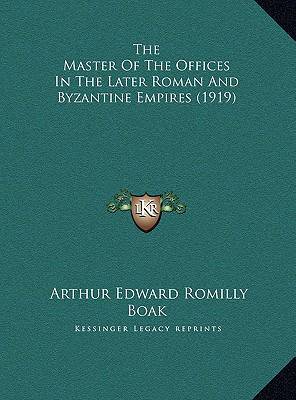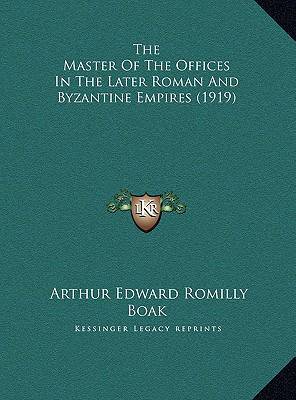
- Retrait gratuit dans votre magasin Club
- 7.000.000 titres dans notre catalogue
- Payer en toute sécurité
- Toujours un magasin près de chez vous
- Retrait gratuit dans votre magasin Club
- 7.000.0000 titres dans notre catalogue
- Payer en toute sécurité
- Toujours un magasin près de chez vous
The Master Of The Offices In The Later Roman And Byzantine Empires (1919)
Arthur Edward Romilly Boak
Livre relié | Anglais
54,45 €
+ 108 points
Description
""The Master of the Offices in the Later Roman and Byzantine Empires"" is a historical book written by Arthur Edward Romilly Boak in 1919. The book explores the role and significance of the Master of the Offices, a high-ranking official in the Roman and Byzantine Empires who was responsible for managing the imperial bureaucracy and overseeing military operations. Boak delves into the origins of the position, tracing its development from the late Roman Empire to the Byzantine era. He examines the duties and responsibilities of the Master of the Offices, including his role in managing the palace guard, organizing military campaigns, and regulating the imperial court. The book also provides an in-depth analysis of the political and social context in which the Master of the Offices operated, including the shifting power dynamics of the Roman and Byzantine Empires. Boak draws on a wide range of primary sources, including official documents, historical accounts, and archaeological evidence, to paint a comprehensive picture of this important figure in imperial governance. Overall, ""The Master of the Offices in the Later Roman and Byzantine Empires"" is a valuable resource for anyone interested in the history of the Roman and Byzantine Empires, as well as the development of imperial bureaucracy and governance.This scarce antiquarian book is a facsimile reprint of the old original and may contain some imperfections such as library marks and notations. Because we believe this work is culturally important, we have made it available as part of our commitment for protecting, preserving, and promoting the world's literature in affordable, high quality, modern editions, that are true to their original work.
Spécifications
Parties prenantes
- Auteur(s) :
- Editeur:
Contenu
- Nombre de pages :
- 170
- Langue:
- Anglais
Caractéristiques
- EAN:
- 9781169723146
- Date de parution :
- 10-09-10
- Format:
- Livre relié
- Format numérique:
- Genaaid
- Dimensions :
- 216 mm x 279 mm
- Poids :
- 684 g

Les avis
Nous publions uniquement les avis qui respectent les conditions requises. Consultez nos conditions pour les avis.






